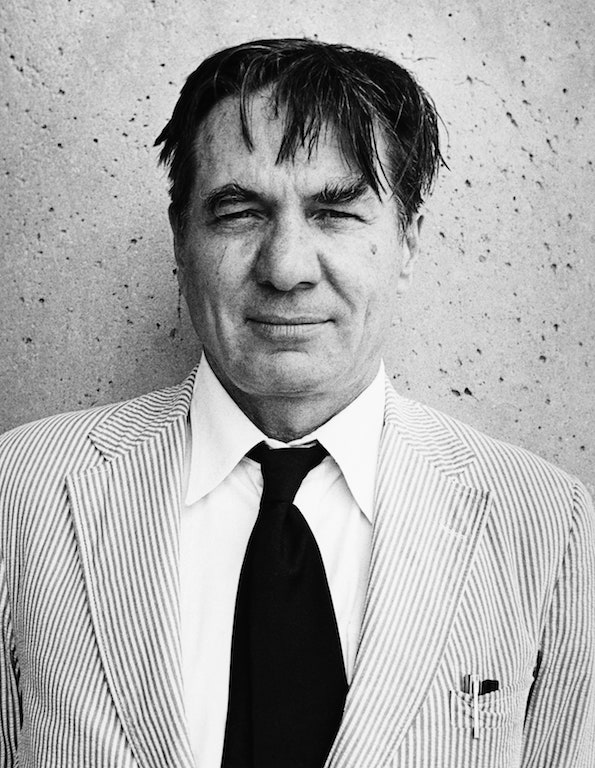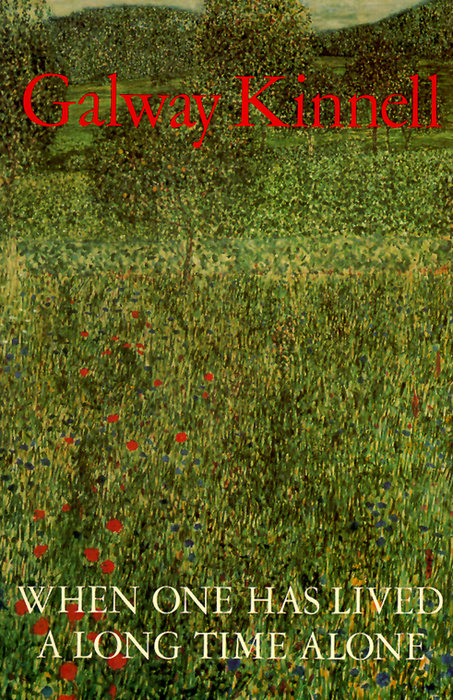1When one has lived a long time alone,one refrains from swatting the flyand lets him go, and one hesitates to strikethe mosquito, though more than willing to slapthe flesh under her, and one lifts the toadfrom the pit too deep to hop out ofand carries him to the grass, without mindingthe poisoned urine he slicks his body with,and one envelops, in a towel, the swiftwho fell down the chimney and knocks herselfagainst window glass and releases her outsideand watches her fly free, a life line flung at reality,when one has lived a long time alone.2When one has lived a long time alone,one grabs the snake behind the headand holds him until he stops trying to stickthe orange tongue—which splits at the endinto two black filaments and jumps outlike a fire-eater’s belches and has littlein common with the pimpled pink lump that shapessounds and sleeps inside the human mouth—into one’s flesh, and clamps it between his jaws,letting the gaudy tips show, as children dowhen concentrating, and as very likelyone does oneself, without knowing it,when one has lived a long time alone.3When one has lived a long time alone,among regrets so immense the past occupiesnearly all the room there is in consciousness,one notices in the snake’s eyes, which look backwithout giving any less attention to the future,the first coating of the opaque milky-blueleucoma snakes get when about to throw their skinsand become new—meanwhile continuing,of course, to grow old—the exact bleu passéthat bleaches the corneas of the blue-eyedwhen they lie back at the end and look for heaven,a fading one knows means they will never find it,when one has lived a long time alone.4When one has lived a long time alone,one holds the snake near a loudspeaker disgorginggorgeous sound and watches him crookhis forepart into four right angles,as though trying to slow down the musicflowing through him, in order to absorb itlike milk of paradise into the flesh,until a glimmering appears at his mouth,such a drop of intense fluid as, among humans,could form after long exciting at the tipof the penis, and as he straightens himself outhe has the pathos one finds in the penis,when one has loved a long time alone.5When one has lived a long time alone,one falls to poring upon a creature,contrasting its eternity’s-face to one’s ownfull of hours, taking note of each difference,exaggerating it, making it everything,until the other is utterly other, and then,with hard effort, possibly with tongue sticking out,going back over each difference againand canceling it, seeing nothing nowbut likeness, until . . . half an hour laterone starts awake, taken aback at how eagerlyone swoons into the happiness of kinship,when one has lived a long time alone.6When one has lived a long time aloneand listens at morning to mourning dovessound their kyrie eleison, or the small thingspiritualized upon a twig cry, “pewit-phoebe!”or at midday grasshoppers scratch the thighs’needfire awake, or peabody birds send schoolboys’whistling across the field, and at dusk, undamped,unforgiving chinks, as from marble cutters’ chisels,or at nightfall polliwogs just burst into frogsraise their ave verum corpus—listens to thosewho hop or fly call down upon us the mercyof other tongues—one hears them as inner voices,when one has lived a long time alone.7When one has lived a long time alone,one knows that consciousness consummates,and as the conscious one among these othersuttering their compulsory cries of being here—the least flycatcher witching up “chec-bec,”or red-headed woodpecker clanging out his musicfrom a metal drainpipe, or ruffed grouse drumming“thrump thrump thrump thrump-thrump-thrump-thrump-rup-rup-rup-rup-rup-r-r-r-r-r-r”deep in the woods, all of them in time’s unfoldingtrying to cry themselves into self-knowing—one knows one is here to hear them into shining,when one has lived a long time alone.8When one has loved a long time alone,one likes alike the pig, who brooks no defermentof gratification, and the porcupine, or thorned pig,who enters the cellar but not the house itselfbecause of eating down the cellar stairs on the way up,and one likes the worm, who by bunching herself togetherand expanding works her way through the ground,no less than the butterfly, who totters full of worryamong the day lilies, as they darken,and more and more one finds one likesany other species better than one’s own,which has gone amok, making one self-estranged,when one has lived a long time alone.9When one has lived a long time alone,sour, misanthropic, one fits to one’s defiancethe satanic boast, It is better to reignin hell than to submit on earth, and forgetsone’s kind—the way by now the snake does,who stops trying to get to the floor and lingersall across one’s body—slumping into its contours,adopting its temperature—and abandons hopeof the sweetness of friendship or love,before long can barely remember what they are,and covets the stillness in inorganic matter,in a self-dissolution one may not know how to halt,when one has lived a long time alone.10When one has loved a long time alone,and the hermit thrush calls and there is an answer,and the bullfrog head half out of water repeatsthe sexual cantillations of his first spring,and the snake lowers himself over the thresholdand disappears among the stones, one seesthey all live to mate with their kind, and one knows,after a long time of solitude, after the many steps takenaway from one’s kind, toward the kingdom of strangers,the hard prayer inside one’s own singingis to come back, if one can, to one’s own,a world almost lost, in the exile that deepens,when one has lived a long time alone.11When one has lived a long time alone,one wants to live again among men and women,to return to that place where one’s ties with the humanbroke, where the disquiet of death and now alsoof history glimmers its firelight on faces,where the gaze of the new baby looks past the gazeof the great granny, and where lovers speak,on lips blowsy from kissing, that languagethe same in each mouth, and like birds at daybreakblether the song that is both earth’s and heaven’s,until the sun has risen, and they standin the light of being made one: kingdom come,when one has lived a long time alone.
When One Has Lived A Long Time Alone
Feature Date
- June 15, 2020
Series
Selected By
Share This Poem
Print This Poem
“When One Has Lived a Long Time Alone” from WHEN ONE HAS LIVED A LONG TIME ALONE
by Galway Kinnell
Copyright © 1990 by Galway Kinnell.
Used by permission of Alfred A. Knopf, an imprint of the Knopf Doubleday Publishing Group, a division of Penguin Random House LLC.
All rights reserved.

Galway Kinnell was the director of an adult education program in Chicago, a journalist in Iran, and a field worker for the Congress of Racial Equality in Louisiana. He taught poetry at colleges and universities in the United States, France, and Australia. His Selected Poems, published in 1982, won both the National Book Award and the Pulitzer Prize. He was a MacArthur Fellow and the State Poet of Vermont. He died in 2014.

New York, New York
Poetry Daily Depends on You
With your support, we make reading the best contemporary poetry a treasured daily experience. Consider a contribution today.



